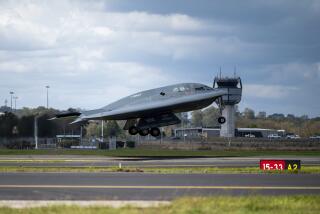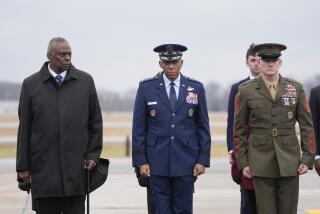Yemen Aiding Terror Inquiry
- Share via
WASHINGTON — U.S. government officials said Tuesday that new cooperation from Yemen’s government since Sept. 11 is adding to mounting evidence linking last year’s bombing of the destroyer Cole in Aden harbor to both the suicide hijackings in America and the 1998 attacks on two U.S. embassies in East Africa.
FBI and intelligence officials have complained bitterly over the last year about Yemen’s lack of assistance in the Cole inquiry. But several U.S. officials said Yemen’s government unexpectedly “opened its files” after the Sept. 11 hijackings.
The U.S. has put extraordinary pressure on governments in the region to cooperate in its war on terrorism. U.S. officials said Yemen’s leaders also were moved when they learned that the World Trade Center collapse killed veteran FBI counter-terrorism chief John P. O’Neill, a man they respected.
A Bush administration official said the new evidence may provide a key break in the long-stalled Cole investigation. A senior State Department official provided a similar account.
According to U.S. law enforcement documents obtained since the Yemeni government opened its files, U.S. officials are seeking at least four men who allegedly helped finance, plan and carry out the Cole attack, as well as a failed attack on another U.S. warship 10 months earlier.
A Bush administration official said all four are members of Osama bin Laden’s Al Qaeda network. U.S. intelligence agencies long have believed that the men were responsible for the Cole attack, the official said.
Chief among the suspects is a man alleged to be a key Al Qaeda operative named Abdurahim Husayn Mohammed Alnashiri, who allegedly also took part in the embassy bombings.
According to a U.S. law enforcement document, Alnashiri is thought to have provided fake ID papers to a Saudi man who helped deliver the truck bomb that devastated the U.S. Embassy in Nairobi, Kenya, on Aug. 7, 1998. The Saudi, Mohamed Rashed Daoud al-’Owhali, is due to be sentenced Thursday in federal court in New York for his role in the case.
U.S. officials also are searching for a 27-year-old man from south Yemen who was secretly photographed by a surveillance camera in Malaysia early last year at a meeting with Khalid Almihdhar, a suspected skyjacker in the airliner that crashed into the Pentagon on Sept. 11.
The Yemeni man had entered and left Thailand three times in the first three weeks of January 2000, when the meeting in neighboring Malaysia occurred, according to the document. A U.S. official described him Tuesday as another suspect in the Cole attack.
The meeting in Malaysia remains the chief link between the previous plots and the Sept. 11 attacks, although several of the alleged skyjackers, including Almihdhar, are believed to have attended Bin Laden’s terrorist training camps at the same time as operatives from previous plots.
A British government communique released this month had asserted links between the three attacks. But few substantive details have emerged to indicate precisely who was involved and in what roles.
The U.S. documents shed new light on the Cole case and outline the clearest evidence yet that Al Qaeda operatives were involved. A senior U.S. official confirmed the outline late Tuesday.
The guided-missile destroyer was refueling in Aden harbor Oct. 12, 2000, when two men motored alongside in a small skiff and detonated several hundred pounds of C-4 military explosives. The explosion killed 17 U.S. sailors and nearly sank one of America’s most modern warships.
Alnashiri helped mastermind the attack, according to the documents, which allege that he provided money to other plotters to buy a small boat, bought a Toyota Hilux truck that was used by the plotters, and was involved in the rental of two apparent safe houses in the summer of 1999.
Alnashiri later told another suspect about his failed attempt to ram a small, explosives-packed boat into the Sullivans, another U.S. warship in Aden, as part of a broad series of Bin Laden attacks timed to coincide with millennium celebrations in January 2000. The small boat sank in the harbor, however.
U.S. officials only learned of the trial run after the Cole attack 10 months later. Alnashiri, according to a U.S. document, ordered an underling to videotape the Cole attack.
Although the FBI launched a worldwide investigation, its agents pulled out of Yemen this summer after months of complaining privately that Yemeni officials repeatedly blocked them from gaining unfettered access to evidence and the questioning of witnesses and potential suspects.
U.S. officials argued that Yemen thus had reneged on a formal agreement with Washington to conduct a joint investigation.
Yemeni authorities had detained nine suspects as of several weeks ago, but U.S. officials contend that they did not play significant roles in the attack. Some U.S. officials even argue that the Yemeni government has tried to shield powerful local officials or members of the country’s religious structure who are linked to Bin Laden.
But U.S. officials say that changed dramatically after Sept. 11.
“From an intelligence perspective we knew early on that Al Qaeda was responsible for the Cole attack,” one official said. “From a law enforcement perspective, we did not have the information we needed to make a case, in part due to a lack of cooperation from the Yemeni government.”
He said the Yemenis “slow-rolled us for some time, promising to give us things they never gave us. They have given us that now.”
“They realized that the game they were playing was over, that the world changed on Sept. 11 and that they had to change the way they did business with us on the Cole investigation,” the official said. “And that is what they have done.”
Barry Mawn, the assistant director of the FBI’s New York office, which is heading the U.S. investigation into the bombing, said the death of O’Neill also was a factor.
O’Neill had headed the FBI’s counter-terrorist squad in New York and had retired in August to become head of security at the twin towers.
Mawn told mourners at O’Neill’s funeral last month in Atlantic City, N.J., that Yemeni authorities had such respect for the former counter-terrorism chief that “they opened their files” on the Cole case.
“Even in death,” Mawn said, “John O’Neill has helped in the fight against terrorism.”
*
Times staff writers Stephen Braun and Eric Lichtblau in Washington and Patrick J. McDonnell in Los Angeles contributed to this report.
More to Read
Sign up for Essential California
The most important California stories and recommendations in your inbox every morning.
You may occasionally receive promotional content from the Los Angeles Times.











